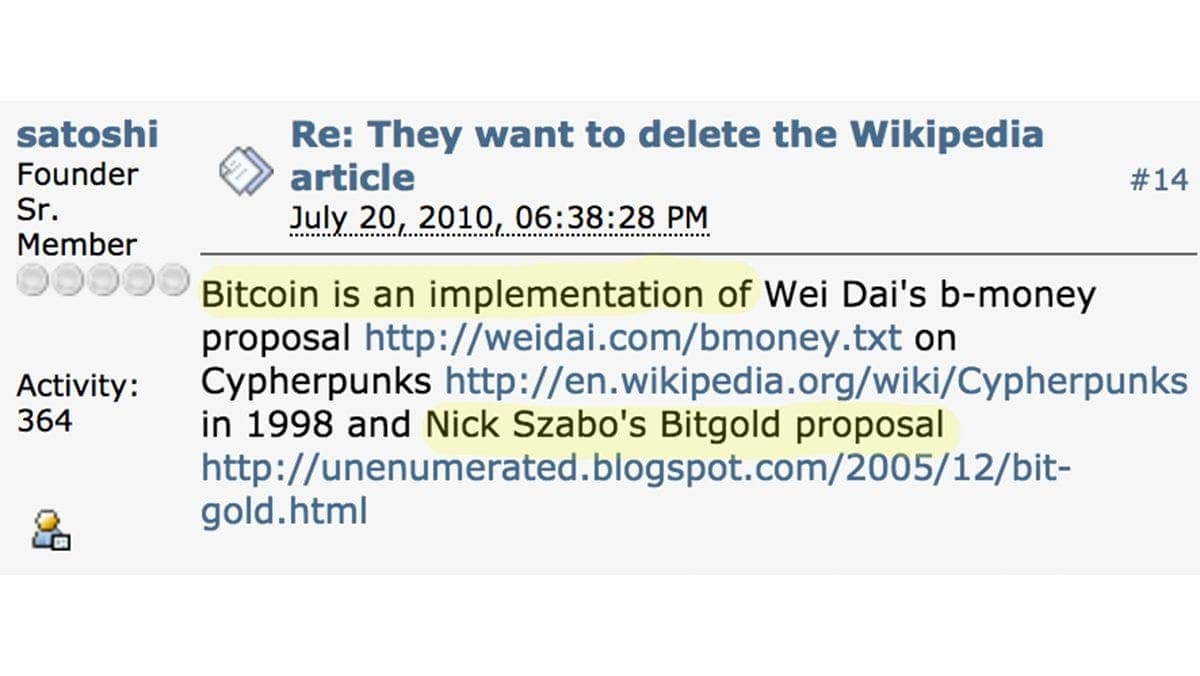Throughout Bitcoin’s history, many have tried—and continue to try—to uncover the identity of its creator, Satoshi Nakamoto.
These theories often point to individuals who had a significant impact on Bitcoin and were forerunners of the cryptocurrency, such as Nick Szabo.
Nick Szabo is a cryptographer, legal scholar, and member of the cypherpunk community who has made and continues to make a significant impact on the Bitcoin community.
He is also the creator of Bitgold, a precursor to Bitcoin and an inspiration for Satoshi Nakamoto.
Additionally, Szabo is the visionary behind smart contracts, which are now widely used in digital currency projects and tokens.
Let’s explore who Nick Szabo is, his background, and his contributions to shaping Bitcoin into what it is today.
Who is Nick Szabo?
Nick Szabo is a cryptographer and legal scholar, best known as the creator of Bitgold, a precursor to Bitcoin, and a pioneer of smart contracts, which are fundamental to blockchain technology.
In terms of his personal life, Szabo is very private, and little is known about his background. However, it is known that he was born in 1964 in Hungary and later moved to the United States.

During his teenage years, he developed an interest in computing, mathematics, and philosophy, which led him to study Computer Science, followed by Law at the University of Washington.
He later worked as a programmer and consultant on various technology projects.
Some of his most notable publications include his 1996 work on smart contracts, the concept of the “God Protocols” in 1997, and Bitgold in 1998.
Szabo remains an active member of the Bitcoin community to this day.
One of his most recent public appearances was at the 2022 Bitcoin Conference in Miami, where he shared insights about the years leading up to Bitcoin’s creation.
The Emergence of Smart Contracts
In 1996, Nick Szabo published a paper titled “Smart Contracts: Building Blocks for Digital Markets“, in which he coined the term “smart contract.”
In this paper, Szabo discusses how a smart contract could automate the execution of agreements formalized between the involved parties.
Nick Szabo’s Concept of Smart Contracts
Nick Szabo defines the concept of smart contracts as follows:
“The success of common law contracts, combined with the high cost of replacing them, makes it worthwhile to preserve and use these principles where appropriate.
However, the digital revolution is radically changing the types of relationships we can have. Which parts of our hard-won legal tradition will still be valuable in the age of cyberspace? What is the best way to apply these common law principles to the design of our online relationships?
Computers make it possible to execute algorithms that were prohibitively expensive before, and networks allow for faster transmission of larger, more sophisticated messages.
Additionally, computer scientists and cryptographers have recently discovered many new and fascinating algorithms.
The combination of these messages and algorithms makes a wide variety of new protocols possible.
New institutions and new ways to formalize the relationships they comprise are now possible thanks to the digital revolution. I call these new contracts ‘smart’ because they are far more functional than their paper-based, inanimate predecessors.
No use of artificial intelligence is implied.
A smart contract is a set of promises, specified in digital form, including protocols within which the parties perform on these promises.”
What are Smart Contracts?
Smart contracts are self-executing digital agreements stored on a blockchain, automatically carrying out the contract’s terms when predefined conditions are met—without the need for intermediaries.
Essentially, smart contracts are self-executing programs triggered by specific conditions and are designed to be immutable and transparent.
For example, the scripts used in Bitcoin represent a form of smart contract.
Smart contracts can be applied in a wide range of scenarios, including automated payments with digital currencies, property transfers, marriages, electronic voting, and more.
According to Nick Szabo, several aspects define a smart contract:
- Expressiveness: It must clearly and accurately express all the terms of the contract.
- Formalism: It requires a formal language that computers can understand and verify.
- Security: Smart contracts must be secure against malicious attacks and security breaches.
- Efficiency: They must be efficient and execute quickly.
- Self-Execution: They should be able to execute automatically when the contract’s conditions are met.
- Immutability: Once created, the smart contract should be immutable and cannot be altered or modified.
- Transparency: All parties involved should have access to the contract’s terms and the results of its execution.
- Privacy: Knowledge and control over the content and execution of the contract should be distributed only as necessary to the parties involved. Third parties should not have a say in the contract’s execution.
“God Protocols”
The “God Protocols” is a concept proposed by Nick Szabo, describing an ideal transaction system where a supreme and infallible entity (symbolized as “God”) perfectly and justly executes contracts, eliminating the risk of fraud or error.
Before proposing Bitgold, a digital currency precursor to Bitcoin, Szabo published an article titled “God Protocols,” where he explored what would constitute the perfect protocol.
In this article, he describes a perfectly trustworthy third party with no possibility for error.
“Imagine the ideal protocol. It would have the most trustworthy third party imaginable — an entity that is on everyone’s side. All parties would send their inputs to God. God would reliably determine the outcomes and return the outputs.
Being God, the supreme in confessional discretion, no party would learn more about the other parties’ inputs than they could learn from their own inputs and the output.”
However, Szabo also notes that while there are algorithms that could act as an automated security third party, these protocols remain highly vulnerable to failure.
Throughout his work, Szabo has consistently opposed third-party mechanisms, advocating instead for systems that protect privacy and maintain data integrity without relying on external intermediaries.
The Invention of Bitgold
In 1998, Nick Szabo developed Bitgold, one of his most notable projects.
At the time, Szabo was involved in cypherpunk communities where cryptography and the idea of a digital currency independent of government control were being explored.
It was within these forums that Szabo interacted with Satoshi Nakamoto, along with other notable cryptographers and enthusiasts such as Hal Finney, Adam Back, and David Chaum.
What is Bitgold?
Bitgold is a theoretical decentralized digital currency project that predated Bitcoin, focusing on security and decentralization through the use of proof-of-work and timestamps.
Thus, Bitgold was one of the first proposals for a decentralized digital currency and was defined as a digital money system that did not require intermediaries.
The idea for the currency never advanced beyond theory, but its definitions laid the groundwork for the creation of Bitcoin in 2009.
Some of Bitgold’s key properties included:
- The creation of a public chain
- Proof-of-work as a security mechanism
- Timestamps
Satoshi Nakamoto even mentioned in a forum post in 2010 that Bitcoin was an implementation based on Wei Dai’s B-money and Nick Szabo’s Bitgold proposal:

Is Nick Szabo Satoshi Nakamoto?
There is no evidence proving that Nick Szabo is Satoshi Nakamoto, the anonymous creator of Bitcoin.
However, due to Szabo’s involvement in the cypherpunk forums where Satoshi Nakamoto was also present and the fact that Szabo introduced several key concepts that were crucial for Bitcoin’s implementation, some people suggest he might be Satoshi Nakamoto.
Supporters of this theory point to coincidences, such as Szabo’s initials (NS) being the reverse of Satoshi Nakamoto’s (SN), and the fact that neither Szabo nor Satoshi is considered a traditional cryptographer, yet both have had a significant impact on the field.
In a podcast with Lex Fridman, billionaire Elon Musk suggested that Nick Szabo could be Satoshi Nakamoto:
“You can look at the evolution of ideas before the launch of Bitcoin and see who wrote about those ideas.
Obviously, I don’t know who created Bitcoin… it seems like Nick Szabo is probably more than anyone else responsible for the evolution of those ideas.
He says he’s not Nakamoto, but it seems like he’s more responsible for the ideas behind Bitcoin than anyone else.”
Despite the ongoing rumors, Szabo has consistently denied being the creator of Bitcoin.
Conclusion
As we’ve seen throughout this article, Nick Szabo has played a pivotal role in the development of Bitcoin, making his story essential knowledge for every Bitcoiner.
Szabo wasn’t just a participant in cypherpunk forums or a digital currency theorist—he shaped how Bitcoin and many other cryptocurrencies function today, particularly through the introduction of smart contracts.
The evolution of his ideas has given us Bitcoin, a powerful tool for privacy today.
Szabo remains active in the Bitcoin community, keeping us connected to someone who was closely involved with Bitcoin’s origins… or maybe he is Satoshi Nakamoto? Who knows?
We hope you enjoyed learning more about Nick Szabo. Feel free to share this article with others, and see you next time!
Share on your social networks:

Founder of Area Bitcoin, one of the largest Bitcoin education projects in the world, she is a marketer, passionate about technology, and a full-time hands-on professional. She has participated in major Bitcoin conferences such as Adopting Bitcoin, Satsconf, Surfin Bitcoin, and Bitcoin Conference.
Did you like this article? Consider buying us a cup of coffee so that we can keep writing new content! ☕







